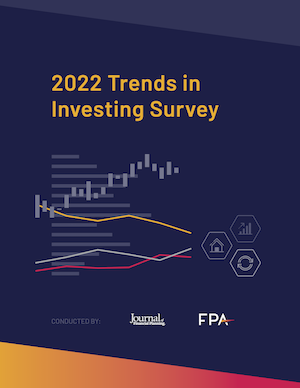DENVER (June 1, 2022) – Over the past four years, financial adviser use/recommendation of environmental, social, and governance (ESG) investing strategies have remained consistent. Still, that usage could see a downward swing over the next 12 months, according to the 2022 Trends in Investing Survey, conducted by the Journal of Financial Planning and the Financial Planning Association® (FPA®), the leading membership organization for Certified Financial Planner™ professionals.

ESG was first added to the survey in 2018 when 26 percent of advisers indicated they were using or recommending them to clients. That percentage grew to 38 percent in 2020 but has leveled off to 32 percent in 2021 and 34 percent in 2022. But it appears adviser sentiment on the asset class could mean less use by advisers moving forward.
According to the survey, the percentage of advisers planning to decrease their use/recommendation of ESG over the next 12 months has more than tripled to 15 percent in 2022—compared to only 4 percent in 2021. Client interest may be fueling this potential shift away from ESG. Over 31 percent of planners say they’ve fielded client questions about ESG investing in the past six months, down from roughly 39 percent in 2020 and 2021.
“ESG investing aligns individual principles, purpose, and values with the virtuous greater good of the human condition and the Earth. Sometimes such missions and esteemed purposes come with higher investment costs and slightly trimmed investing returns,” says Dr. Preston Cherry, CFT-I™, CFP®, practitioner editor of the Journal of Financial Planning. “If ESG investing has reached an inflection point, it could be due to several factors, including higher fees, lower performance, or a lack of ESG impact and index differentiation that inspires investment.”
Other ESG-related findings of note from the survey include:
- While 17 percent of advisers have started looking into ESG strategies, they don’t plan to make any investments in the next three years.
- Forty-five percent of advisers believe that asset managers and portfolio management teams with ESG expertise are the best source of ESG data. But a quarter of advisers say they rely on third-party raters to evaluate funds.
- Clean energy is a leading objective when considering an ESG fund, cited by nearly 32 percent of advisers—more than twice those who said they seek sustainable property and finance solutions in ESG funds. Water management, and sustainable transport and infrastructure, are tied at 12 percent.
- Thirty-seven percent of advisers say integrated risks/opportunity is the most attractive approach for selecting ESG funds for their clients. Nearly 19 percent of advisers say they look for funds that use a positive screen, while 15 percent prefer negative screens.
FPA and the Journal of Financial Planning also examined digital assets (cryptocurrencies) this year after the 2021 survey revealed notable shifts in adviser use and sentiment. In 2021, 14 percent of advisers said they used or recommended cryptocurrencies, which was a significant jump from 2020 when less than 1 percent of advisers used or recommended them. This year, only 11 percent of advisers say they use/recommend them, and while 13 percent plan to increase their use over the next 12 months, 11 percent plan to decrease their use over the same period—a 7 percent jump from the previous year. Client interest has remained the same, with 47 percent of advisers saying they have received client questions about cryptocurrencies over the past six months, compared to 49 percent in 2021.
“Financial advisers must keep client goals, risk tolerance, and capacity in mind when recommending any investment—especially with cryptocurrencies since they remain an emerging asset class,” says Cherry. “The survey results clearly show clients continue to be curious about cryptocurrencies. But they need to work with their adviser to ensure they are behaviorally sound, receive objective advice, and invest within their risk tolerance and capacity.”
Each year, the survey looks at where financial advisers are investing today and where they plan to increase or decrease investments over the next 12 months. Exchange-traded funds (ETFs) continue to wear the crown as the preferred investment vehicle by financial advisers, with 65 percent currently using or recommending them. Cash/equivalents and non-wrap mutual funds are second at 52 percent, respectively. Interestingly, non-wrap mutual funds top the list for those investment vehicles advisers plan to decrease their use/recommendation of in the next 12-months (23%), which is tied with advisers who do not plan to make any changes.
The 2022 survey, which received 413 responses from financial advisers of various backgrounds and business models, also indicated that clients were asking less about the effects of Covid-19 (47%) in their portfolios than they were in the previous year, but inflation is top of mind among clients at 66 percent.
Of those surveyed, 52 percent are Certified Financial Planner™ professionals, 37 percent indicated they work as an independent IAR/RIA, and 19 percent say they have more than 21 years of financial services experience. A full report of the 2022 Trends in Investing Survey is available and includes additional details and narratives.
Additional research by FPA is available at www.financialplanningassociation.org/learning/research.
###
About the Financial Planning Association
The Financial Planning Association® (FPA®) is the leading membership organization for CERTIFIED FINANCIAL PLANNERTM professionals and those engaged in the financial planning process. FPA is the CFP® professional’s partner in planning by helping them realize their vision of professional fulfillment through practice support, learning, advocacy, and networking. Learn more about FPA at financialplanningassociation.org and on Twitter at twitter.com/fpassociation.
About the Journal of Financial Planning
First published in 1979, the mission of the Journal of Financial Planning is to expand the body of knowledge in the financial planning profession. With monthly feature articles, interviews, columns, and peer-reviewed technical contributions, the Journal's content is dynamic, innovative, thought-provoking, and directly beneficial to financial planners in their work. Learn more at www.fpajournal.org.